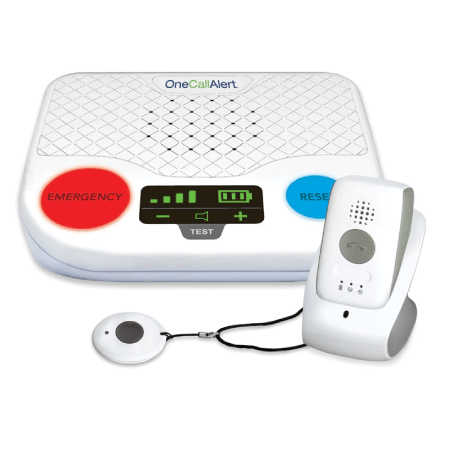Best Medical Alert Systems With Fall Detection for Seniors IN 2024
Explore the best medical alert systems on the market that offer excellent fall detection for seniors.
Best Overall
Best for Device Range
Best Affordable Mobile Monitoring System
Best for Extra Features
Brio House is an independent review site. We may earn money when you click links inside our site.
Did you know that every year, more than a quarter of Americans aged 65 and over will experience a fall? The U.S. government’s own disease prevention agency confirms this to be the case (CDC).
Even if you don’t suffer any physical harm, the stress of a fall may have a major impact on your daily life. Medical Guardian and Bay Alarm Medical are just two examples of the many medical alert systems available today, and they both provide fall detection capabilities. Those with a greater risk of falling, such as the elderly, may benefit greatly from using such a device.
Medical alert systems with fall detection may identify when their user has fallen and immediately dispatch assistance. You can simply add fall detection to most medical alert systems for an additional $5–$10 per month; it’s well worth it for the peace of mind it may bring.
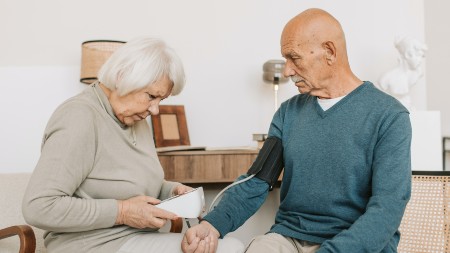
Is Automatic Fall Detection Accurate?
Automatic fall detection technology has improved in recent years and can accurately detect many types of falls. However, it is important to note that no fall detection system is 100% accurate, and false alarms can occur.
Factors such as the intensity and direction of the fall, the surface on which the fall occurs, and the positioning of the fall detection device on the body can all affect the accuracy of the system. Some fall detection systems may also have difficulty distinguishing between falls and other movements, such as sitting or lying down quickly.
Overall, while fall detection technology can be a helpful tool for older adults and their loved ones, it is important to remember that it is not a substitute for personal care and attention.
How Does Automatic Fall Detection Work?
Some fall detection systems use accelerometers and gyroscopes to measure changes in speed, direction, and orientation. When a fall occurs, these sensors detect a sudden change in velocity and direction, and then the system immediately sends an alert.
Other fall detection systems may use pressure sensors that are built into a wearable device, such as a pendant or a wristband, which can detect sudden impacts caused by falls. The sensors in the device measure changes in pressure and can determine when a fall has occurred.
Regardless of the type of technology used, when a fall is detected, the system sends an alert to the monitoring center or emergency contact. Depending on the system, the alert can be sent via a cellular network, a landline, or a Wi-Fi connection.
It’s important to note that no fall detection system is 100% foolproof. Some systems may have trouble detecting falls in certain situations, such as when a fall is slow or gradual, or when it occurs on a soft surface. However, fall detection technology can be a valuable tool in helping to provide added safety and security for older adults who may be at risk of falling.
So today, we’re here to help you find the best medical alert system for your requirements. See for yourself which medical alert system companies made the cut by checking out the list of our top picks.

Do Medical Alert System With Fall Detection Work?
Yes, medical alert systems with fall detection can be effective in providing an added layer of safety and security for seniors or individuals with medical conditions who are at risk of falling. However, they are not foolproof and may have limitations in detecting certain types of falls.
WHAT’S THE Best Medical Alert Systems With Fall Detection for Seniors in 2024?
- GetSafe: Best Overall
- Medical Guardian: Best for Device Range
- One Call Alert: Best Affordable Mobile Monitoring System
- Life Fone: Best for Extra Features
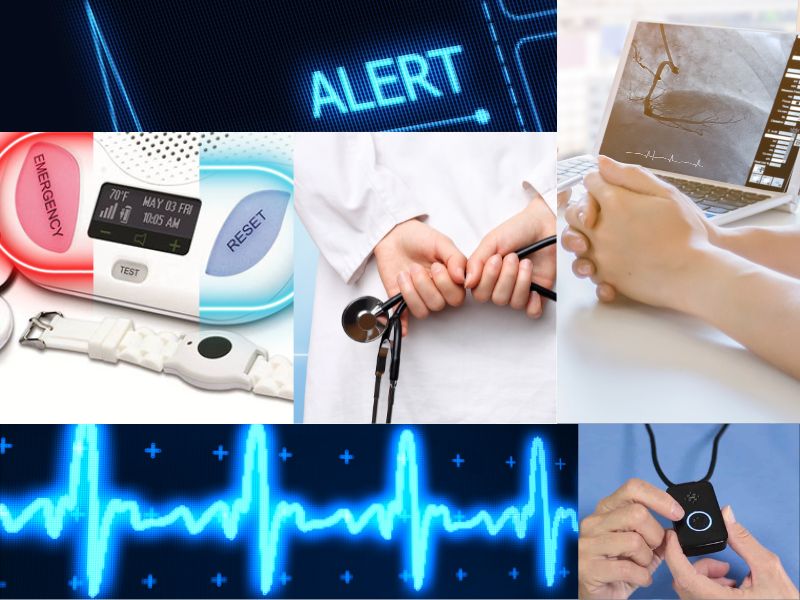
Reviews: The Best Medical Alert Systems With Fall Detection for Seniors In 2024
As we age, falls become a more significant risk, and in some cases, they can lead to serious injuries or even death. That’s why having a medical alert system with fall detection can be a valuable tool for seniors who live independently or have mobility issues.
In this article, we have compiled a list of the best medical alert systems with fall detection to help seniors and their loved ones make an informed decision when choosing a device. From features such as automatic fall detection to 24/7 monitoring, each system offers unique benefits to ensure seniors can get help quickly and efficiently in the event of a fall.
Compare the Best Medical Alert Systems With Fall Detection of 2023
1. GetSafe
Best Overall
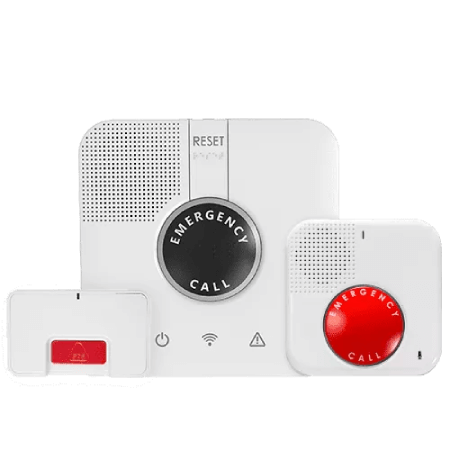
GetSafe
Our Rating:

5.0
GetSafe, a product of Bay Alarm Medical Corporation, is the medical alert system with fall detection that we recommend the most so dar. GetSafe, hands down, stands out among the medical alert systems we studied because its activation doesn’t need a necklace or wristband button. You can simply activate it by saying “Call 9-1-1” or by pressing a button on a wall.
GetSafe’s fall detection requires a necklace to be worn around the neck; this pendant can detect a fall up to 800 linear feet from the base station. All three of GetSafe’s in-house packages charge the same $27.95 / month for monitoring. The equipment included with each plan varies; the Starter plan provides a base station, a voice-activated wall button, and a lanyard, while the Choose plan provides a base station, three voice-activated wall buttons, two regular wall buttons, and a lanyard button.
Families needing between two and three bedrooms will find the Standard design to be an excellent middle ground.
PROS
CONS
Top Review
“GetSafe medical alert system has been a lifesaver for me. The reliable fall detection and easy-to-use emergency button give me peace of mind knowing that help is just a press away.“
2. Medical Guardian
Best for Device Range
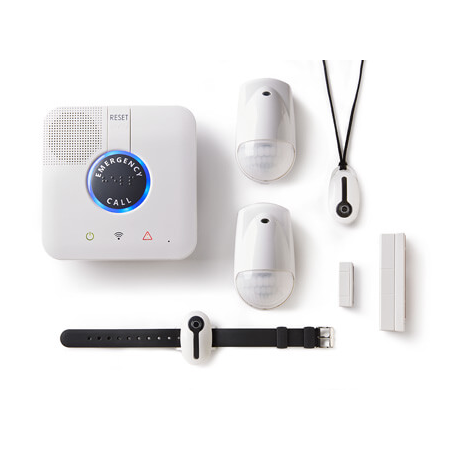
Medical Guardian
Our Rating:

4.7
Our research showed that the Medical Guardian system has the best device range by far, with a maximum range of 1,400 feet. This implies that the user may be up to 1,400 feet away from the base unit and still have the fall detection necklace or bracelet recognize a fall and alert the monitoring center.
When compared to other medical alert systems that also include fall detection, Medical Guardian stands out as one of the best due to its advantageous mix of features, reliability, and cost. It boasts a rapid reaction time of 1-15 seconds, which is much lower than the industry average of 30 seconds, and it is tied with LifeFone for the most connection types (landline, AT&T, and Verizon cellular).
Although automatic fall detection isn’t part of the monitoring plans, you may add it for $10 per month. But, the fall detection feature isn’t available on every Medical Guardian product. The MG Move smartwatch is the only product without it. Several firms on the list provide fall detection as an extra add-on for all their products.
Our team tested Medical Guardian’s fall detection function and concluded that it properly identified simulated falls from a standing posture. Take into account that no fall detection system can recognize each and every fall.
PROS
CONS
Top Review
“I’ve been using Medical Guardian for my elderly father, and I’m extremely satisfied with the service. The system is reliable, and the customer service is exceptional – they are always there to answer any questions or concerns that I have. The fall detection feature has been a lifesaver, and I feel much more confident knowing that my father has access to help if he needs it. Overall, I highly recommend Medical Guardian to anyone looking for a reliable and affordable medical alert system.“
3. One Call Alert
Best Affordable Mobile Monitoring System
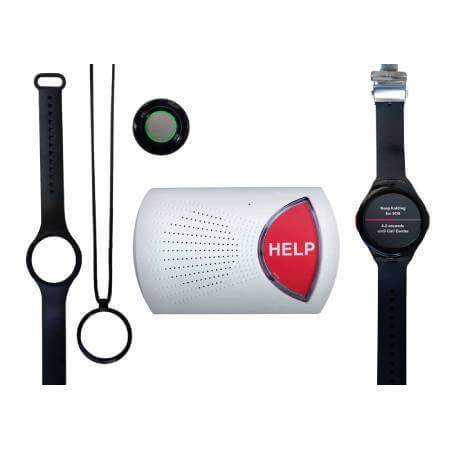
One Call Alert
Our Rating:

4.6
Plans from One Call Alert‘s medical alert system vary from two in-home options (landline and cellular) to two mobile options (mobile base station and all-in-one wearable device). You may choose from a variety of monthly options beginning at $22.95 and going all the way up to $39.95.
One Call Alert charges an extra $10.00 monthly for a fall detector necklace to be used with specific subscriptions. In particular, the $41.95 a month Complete Protection Plan bundles a home cell phone service with an unlimited data plan.
The Mobile Double plan on the other hand, is a great option for couples who desire a more cost-effective two-person plan.
PROS
CONS
Top Review
“As someone who cares for an elderly loved one, One Call Alert medical alert system has been a godsend. The system is incredibly easy to use, and the 24/7 monitoring ensures that my loved one can get help quickly in the event of an emergency. I would highly recommend this system to anyone looking for a reliable and affordable medical alert system.“
4. Life Fone
Best for Extra Features
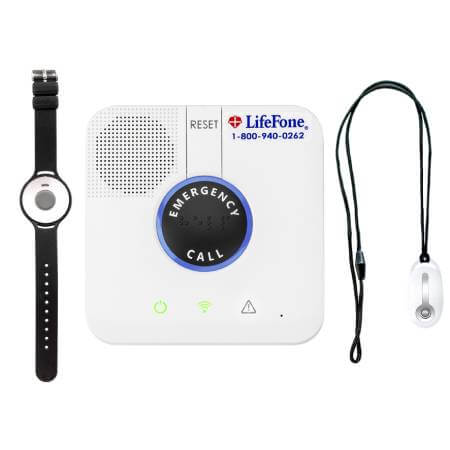
Life Fone
Our Rating:

4.7
LifeFone is an excellent option for seniors who desire extra features since it is an all-in-one medical alert system.
It is a medical alert system with fall detection, but it also serves as a home monitoring system with a smoke alarm, carbon monoxide detector, prescription reminder, and an activity tracker.
LifeFone’s premium services include a daily check and check-in call to make sure everything is running well and answer any questions you may have. Users of medical alert systems benefit greatly from these kinds of additional features since they meet their specific requirements.
In addition to a long battery life and inexpensive automated fall detection, the company’s gadgets have a range of 1,300 feet. Monthly monitoring begins at $25, but fall detection is just $5, or roughly half of what other firms charge.
A disadvantage of the LifeFone system is that the fall detection necklace must be worn in addition to the primary medical alert pendant.
Customer care for LifeFone may be reached through phone or email, with phone help accessible Monday through Friday from 9 a.m. to 10 p.m. EST, and Saturday and Sunday from 9 a.m. to 9 p.m. EST. The firm has a credit card and debit card payment option, as well as an online bill pay service.
PROS
CONS
Top Review
“Life Fone medical alert system has been a great choice for my elderly grandmother. The system is simple to use, and the customer service is top-notch. I’m glad we chose Life Fone to provide an added layer of safety and security for my grandmother, and I highly recommend it to others in a similar situation.“
5. Medical Alert
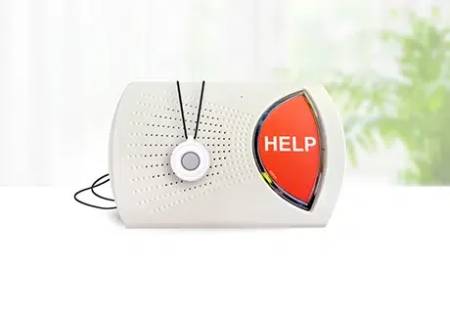
Medical Alert
Our Rating:

4.6
Medical Alert is a good alternative for individuals who want fall detection as an add-on to their landline home service.
The company delivers a wearable emergency button that can detect falls automatically and has a range of up to 800 feet.
A combination of accelerometers, barometric pressure sensors, and an intelligent algorithm allow the fall detection pendant to discern between genuine falls and false alarms. U.S.-based operators at Medical Alert’s monitoring centers will be alerted to a fall and will make contact to provide aid.
Moreover, Medical Alert’s Mobile system includes a two-way GPS mobile device that may be worn both at home and away from it, and is compatible with optional fall detection.
One of the most cost-effective medical alert plans is the $19.95 per month for the semi-annual or yearly plan for the basic tier landline in-home plan with no additional features. Under the semi-annual or yearly plan, the mobile system costs $39.95 each month, plus a one-time $49.00 programming charge.
PROS
CONS
Top Review
“As someone who lives alone and has a medical condition, the Medical Alert medical alert system has been an invaluable resource for me. The system is reliable, easy to use, and the customer service is exceptional. I would recommend this system to anyone looking for a high-quality medical alert system that provides peace of mind and a sense of security.”
6. Lifeline

Lifeline
Our Rating:

4.5
Lifeline’s AutoAlert fall detection system is well regarded in the industry. In fact, our team found it to be the most accurate medical alert system on this list.. What’s even better? HomeSafe’s AutoAlert and On the Go systems both come included with fall detection at no additional cost.
AutoAlert integrates three different methods for detecting falls. Like other fall detection systems, its first function is to calculate the velocity of the fall. Second, it features a barometer that is sensitive enough to detect wind gusts. The barometer’s accuracy is such that it can measure variations in air pressure at various distances above ground.
The sensor’s accuracy is finally double-checked using Lifeline’s unique methodology. While other systems may miss a fall, AutoAlert is able to detect it. The amount of unneeded alerts or falls that go unreported because the gadget didn’t detect them is lowered as a result. It’s vital to keep in mind that no fall detection system can be 100% reliable, even if Lifeline claims their technology can detect 95% of falls.
To better serve its customers, Lifeline provides many channels of contact, including phone, email, and live chat. You may call them at 855-332-7799 from 7:00 am to 11:00 pm EST Monday through Friday, and from 8:00 am to 5:00 pm EST on Saturday. The chat service is convenient if you only need a fast answer to a query since it puts you in touch with a representative instantly. The accessibility through chat is equivalent to that via telephone.
You may pay for services from Lifeline using cash, cheque, or card. Remember that there is a monthly cost of $3.50 if you opt to pay with a check.
To better serve its customers, Lifeline provides many channels of contact, including phone, email, and live chat. You may call them at 855-332-7799 from 7:00 am to 11:00 pm EST Monday through Friday, and from 8:00 am to 5:00 pm EST on Saturday. The chat service is convenient if you only need a fast answer to a query since it puts you in touch with a representative instantly. The accessibility through chat is equivalent to that via telephone.
You may pay for services from Lifeline using cash, cheque, or card. Remember that there is a monthly cost of $3.50 if you opt to pay with a check.
PROS
CONS
Top Review
“My experience with the Lifeline medical alert system has been fantastic. The system is reliable, and the fall detection feature has given me added confidence and security when going about my daily routine. The customer service is also exceptional, and I appreciate the peace of mind that comes with knowing that help is just a button press away.”
7. Bay Alarm Medical

Bay Alarm Medical
Our Rating:

4.6
If you need a medical alert system, Bay Alarm Medical has you covered at home or on the move with their portable and wearable devices. The Bay Alarm wristwatch is not compatible with the company’s fall detection buttons, but its home landline and mobile GPS systems are. Bay Alarm Medical’s U.S.-based monitoring center is immediately alerted if a fall is detected and subsequent movement is not.
As part of their services, Bay Alarm’s monitoring centers use LanguageLine, a tool that can translate conversations into as many as 170 distinct tongues. Prices for medical alert devices from Bay Alarm Medical begin at $24.95 per month for the standard landline kit and go up to $49.95 per month plus $159.00 in gadget fees for the whole in-home and wristwatch package.
PROS
CONS
Top Review
“Bay Alarm Medical has been a reliable and trustworthy medical alert system for my elderly mother. The system is easy to use, and the fall detection feature has given her added confidence to move around independently. The customer service is also exceptional, and I appreciate the peace of mind that comes with knowing that my mother is in good hands. I highly recommend Bay Alarm Medical to anyone looking for a reliable and affordable medical alert system.”
How We Ranked the Top Life Alert Systems
When it comes to ranking the top life alert systems, there are several factors to consider. We conducted extensive research to evaluate each provider’s offerings and ranked them based on a variety of criteria. Here are some of the factors we took into account when determining our rankings:
- Fall Detection: We looked at the effectiveness of the fall detection technology offered by each provider. This included evaluating the sensitivity of the sensors and the accuracy of the detection.
- Device Range: We evaluated the range of each provider’s devices, both in and outside of the home. This is important to ensure that the user can receive assistance in the event of an emergency, regardless of their location.
- Connection Types: We analyzed the types of connections each provider offers, including landline, cellular, and Wi-Fi. This is important to ensure that the user can be reached in the event of an emergency, regardless of their location or the availability of certain types of connections.
- Monitoring Centers: We evaluated the quality and responsiveness of each provider’s monitoring centers. This included analyzing the training and certification of the operators, as well as the technology used to track the user’s location and respond to emergencies.
- Customer Support: We evaluated the quality and availability of customer support offered by each provider. This included analyzing the ease of contacting customer support, the responsiveness of the support team, and the quality of assistance provided.
- Cost: We evaluated the cost of each provider’s plans, including any upfront fees, monthly charges, and additional costs for features such as fall detection and mobile monitoring.
By taking all of these factors into account, we were able to rank the top life alert systems available on the market today.
Our rankings offer a comprehensive guide to help you choose the best life alert system for you or your loved one.
Frequently Asked Questions:
Are Mobile Medical Alert Devices Water-Resistant?
Many mobile medical alert devices are water-resistant, but it ultimately depends on the specific device and its design. Some devices may be completely waterproof, while others may only be water-resistant and able to withstand splashes or brief immersion in water.
If you are considering a mobile medical alert device and need it to be water-resistant, it is important to research the device’s specifications and look for a high water-resistance rating, such as an IP68 rating, which indicates that the device is dust-tight and can be submerged in up to 1.5 meters of water for up to 30 minutes. It is also important to follow the device’s care instructions and avoid exposing it to water for prolonged periods or in extreme conditions.
Keep in mind that while water resistance can protect your device from accidental splashes or brief submersion in water, it is not a guarantee against damage caused by water exposure. If you plan to use your mobile medical alert device in or around water, it is important to take appropriate precautions and consider using additional protective measures, such as a waterproof case or cover.
Does AARP Recommend Medical Alert Systems for Seniors?
Yes, AARP (American Association of Retired Persons) recommends medical alert systems for seniors as a way to stay safe and independent. AARP recognizes the importance of these systems in helping seniors get emergency assistance in the event of a fall or other medical emergency. They suggest that seniors and their families consider the benefits of medical alert systems, including the ability to summon help quickly and easily, the peace of mind it can provide, and the potential to prevent serious injuries.
AARP has also conducted its own reviews of medical alert systems, looking at factors such as pricing, features, and customer support. They have published several articles on their website that provide information and guidance for seniors who are considering purchasing a medical alert system. Additionally, AARP members may be eligible for discounts on some medical alert systems through the organization’s member benefits program.
Are Any Medical Alert Systems Covered by Medicare?
While medical alert systems are not typically covered by Medicare, some Medicare Advantage plans may offer coverage for certain medical alert systems as part of their benefits package. However, the availability and coverage of these systems vary depending on the specific plan and provider.
Additionally, some Medicaid programs may offer coverage for medical alert systems, but again, coverage and availability can vary by state and program.
It’s always best to check with your insurance provider to see if they offer any coverage for medical alert systems.
Is Automatic Fall Detection Accurate?
Automatic fall detection technology has improved in recent years and can accurately detect many types of falls. However, it is important to note that no fall detection system is 100% accurate, and false alarms can occur. Factors such as the intensity and direction of the fall, the surface on which the fall occurs, and the positioning of the fall detection device on the body can all affect the accuracy of the system. Some fall detection systems may also have difficulty distinguishing between falls and other movements, such as sitting or lying down quickly. Overall, while fall detection technology can be a helpful tool for older adults and their loved ones, it is important to remember that it is not a substitute for personal care and attention.
How Does Automatic Fall Detection Work?
Some fall detection systems use accelerometers and gyroscopes to measure changes in speed, direction, and orientation. When a fall occurs, these sensors detect a sudden change in velocity and direction, and then the system immediately sends an alert.Other fall detection systems may use pressure sensors that are built into a wearable device, such as a pendant or a wristband, which can detect sudden impacts caused by falls. The sensors in the device measure changes in pressure and can determine when a fall has occurred.Regardless of the type of technology used, when a fall is detected, the system sends an alert to the monitoring center or emergency contact. Depending on the system, the alert can be sent via a cellular network, a landline, or a Wi-Fi connection.It’s important to note that no fall detection system is 100% foolproof. Some systems may have trouble detecting falls in certain situations, such as when a fall is slow or gradual, or when it occurs on a soft surface. However, fall detection technology can be a valuable tool in helping to provide added safety and security.
